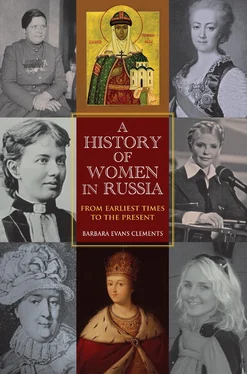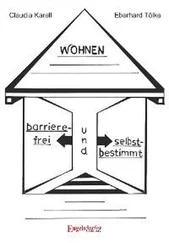artists, 87, 162; 304; women as, 68, 149, 162–64, 209, 213, 264
Artiukhina, Alexandra, 197–98, 199, 203
arts. See artists
Arzamas, 49
Arzamasskaia, Alena, 49
Asia, 202, 274
Assembly of Russian Factory and Mill
Workers, 169
Association for Women in Slavic Studies, xxiii
Association in Defense of Azerbaijan Women’s Rights, 284
Association of Small People’s of the North, 283
Association of Women Entrepreneurs of Russia, 296
Astrakhan, 45
attorneys. See lawyers
August Coup (1991), 279, 281
Augustus, Roman Emperor, 65
Austria, 97, 154, 180
authority of women, xiv; among Rus, 2, 18, 20, 23; 1462–1695, 22–33, 37, 40, 45, 47, 56; 1695–1855, 73, 78, 101–102, 104; 1855–1914, 150, 156; 1914–30, 20
avant-garde, 149, 159, 164, 194
Avignon, property rights of women in, 13
Avvakum, 52, 53, 54, 55, 56
Axis, 211, 212, 237
Azerbaijan, xxii, 226, 286; discussion of woman question in, 177, 292; women in, 201, 226–28, 274, 304–305. See also Baku
Azerbaijan Gender Information Center, 228, 304–305
babi bunty, 214–15, 219, 230
Baghdad, 178
Baku, 226; colonial women in, 156; Muslim intelligentsia of, 178; organizing of women’s regiments in, 184
Baku, women of: 1953–91, 272–73, 284; after 1991, 304–305
Balkans, 25, 97, 109, 198
Baltic states, 66, 97, 100, 109, 225, 286; women’s activism in, 172, 176–77
banking, 289
Baranov, V. D., 266
Baranskaia, Natalia, xvix, 264, 269–70, 275
Barber, John, 237
Bardina, Sophia, 124, 126
Bashkir, 120
battered women’s shelters, 307
Beijing, United Nations Women’s
Conference in, 307
Bek, Anna, 165
Belaeva, Nina, 281–82
Belarus, 279, 289, 311, 313; annexation of, 108; hardships of World War II in, 247; industrialization in, 152; politics after 1991, 286, 301, 312; Slavic farmers in, 3, 121, 127; women soldiers in, 184–85, 239–40, 244
Belarusian State University, 311, 315
Belarusians, xiii, 152
Belinskii, Vissarion, 96
Belousova, Liudmila, 264
Belskaia, Maria, 216
Berkhoff, Karel, 247
Berlin, xviii, 165, 237, 247
Bernstein, Laurie, 143
Bershanskaia, Evdokia, 240
Beslan, terrorist invasion of school in, 302–303
Bestuzhev Courses, 118, 123–124, 146, 165, 174
Bestuzhev-Riumin, K. N., 118
Bible, 94, 311
Biriukova, Alexandra, 279
Birobidzhan, 229
birthrate: of peasants in 18th and 19th centuries, 103; in 1930s, 216, 225; in 1940s, 248–49; 1953–91, 259; after 1991, 290, 295
Black Earth, 99
black market, 220, 229, 258
Black Sea, 2, 45
Bloody Sunday, 1905, 169, 194
blue-collar workers, women as. See working-class women
boarding schools, 92–93, 116–117
Bochkareva, Maria, 185–87, 196
Bogdan, Valentina, 220
Bohac, Rodney, 102
Bohemia, 58
Bolshevichki. See Bolshevik feminists Bolshevik party, xxi; in 1917, 182–83, 185, 187, 188, 190; during civil war, 191–92; gender ideas of, xvi, 190, 196; policies toward women of (1917–21), 191; women in, 180, 187–88, 189–90, 191, 255. See also Bolshevik feminists; Communist Party of the Soviet Union
Bolshevik feminists, 190–91, 192, 211, 221, 251. See also feminism Bonner, Elena, 276
Borderlands, 152, 175. See also specific countries
Boretskaia, Marfa, 20–23, 25, 322n23
Boretskii, Fedor, 22
Boretskii, Izak, 22
Boretskii, Vasili, 22
Borisova, N., 281
Brezhnev, Leonid, 273, 276, 277; gender ideas during rule of, 274–76, 293; and the woman question, 258–61
bride price, 103, 200, 226, 228, 273
Bridger, Susan, 293
brothels, 143, 144, 152, 173
Brussels, 318
Buddha, 274
Buddhism, 46
Bulgaria, 258
Buloichik, Liudmila, 310
Bund, 153
Burgundy, 316
Buryats, 46, 47, 155, 228, 273, 274
Bushueva, Valentina, 246
Byzantine Empire, 2, 7, 8, 9, 12, 53
Cambridge University, 146
Canadian Fund for Gender Equality, 307
Catherine I, 67, 68, 69
Catherine II, the Great, xiv, xix, 68, 83; accomplishments of, 73–74; coup of, 72; early life of, 70–72, 85–86; educational policies of, 74–76, 117; and Ekaterina Dashkova, 76, 78; and Enlightenment, 72, 74, 93, 95; and expansion of Russia, 108; and imagemaking, 72–74, 87; and limiting of monasteries, 160; and strengthening of serfdom, 98, 108
Catholicism, 56, 198; and abortion, 295; and differences with Orthodoxy, 9; gender ideas of, 10–11, 34; in Lithuania, 177, 297; marriage law of, 13–14, 93, 109; religious orders of, 40, 41, 160, 161; and witchcraft, 42
Caucasus, 215, 240, 251; abortion in, 225, 295; Communist reforms in, 226; economic conditions in (1953– 91), 267; economic conditions (after 1991), 287, 310; gender concerns after 1991, 293; politics of (after 1991), 286, 287, 292; Russian expansion into, xiii, 108, 156, 200; women as preservers of tradition in, xv, 273–74, 275; women in (1953–91), 272–73; women in (after 1991), 289, 296, 304–305, 307. See also Armenia; Azerbaijan
Cavender, Mary Wells, 81, 88
Central Asia, xiii, 228, 233; abortion in, 225, 295; birthrate after 1991, 290;
Communist reforms in, 200–201, 207, 226; economic conditions in (1953–91), 267; economic conditions in (after 1991), 27–88, 310; expansion into, 108, 156; politics of (after 1991), 286, 292, 301; reaction to collectivization in, 215, 216. See also Tajikistan; Uzbekistan; Unveiling Campaign
Central Asia, women in: 1930s, 226; 1953–91, 272–73; after 1991, 288, 289, 296, 307; women’s activism in, 181; women as preservers of tradition in, xv, 273–324, 275
Central Committee of the Communist Party, 190, 192, 262
Central Europe, 109; importation of gender ideas from, 5, 64, 317; women’s migration to, after 1991, 289
Central Washington University, 313
chadrah, 227
Chaikovskii Circle, 125
charity, 93–94. See also philanthropy, women in
Charlotte of Prussia. See Alexandra, Empress, wife of Nicholas I
“Charter to the Nobility,” 73
Chechens, 251, 303
Chechnya, war with rebels in, 293, 302–303, 305
Chekhov, Anton, 233
Chekhova, Maria, 170
Chernenko, Konstantin, 277
Chernigov, 19
Chernyshevskii, Nikolai, 115, 118–19, 123, 124, 126
Chicago, 318
childbirth: practices among Rus peasants, 4; among Muscovite peasants, 29; under serfdom, 104, 106; after Emancipation, 130; in 1930s, 216; in 1970s, 272
childcare, 178, 193, 225
childcare, Soviet programs of: 1917–30, 175; in 1920s, 195; in 1930s, 223; in World War II, 247–48, 252; in postwar period, 259, 270, 282, 286, 291, 295
Children of Chernobyl, 308
China, 15, 48; Nicholas II’s foreign policy toward, 114; propagation of gender values in Qing period of, 65; Soviet program of women’s emancipation in, 262
Chinese Communist Party: and cult of domesticity, 85; and Soviet program of women’s emancipation, 196, 202
Christianity: conversion of Rus to, 2, 4, 9–12, 23; conversion of Siberians to, 156; in family life, 34; impact on gender ideas, 10–12; Jewish conversion to, 153; schismatic activity of women in, 53–54; syncretism with pagan beliefs of, 106–107; women’s role in conversion to, xviii, 9–10, 16, 25, 53
Chukchi, 46, 47
Church Statute of Prince Iaroslav, 14
cigarette workers, women as, 131, 136, 142
cities, 1, 2, 5, 15, 78, 89, 170, 214, 238; elsewhere in Europe, 93, 101, 107; gender ideas in, 150–51; growth of (after 1860), 112, 152; impact of, on countryside after 1860, 127–28, 129, 131, 133–34, 203; migration to, 113, 132–33, 217, 272, 273, 288
Читать дальше












